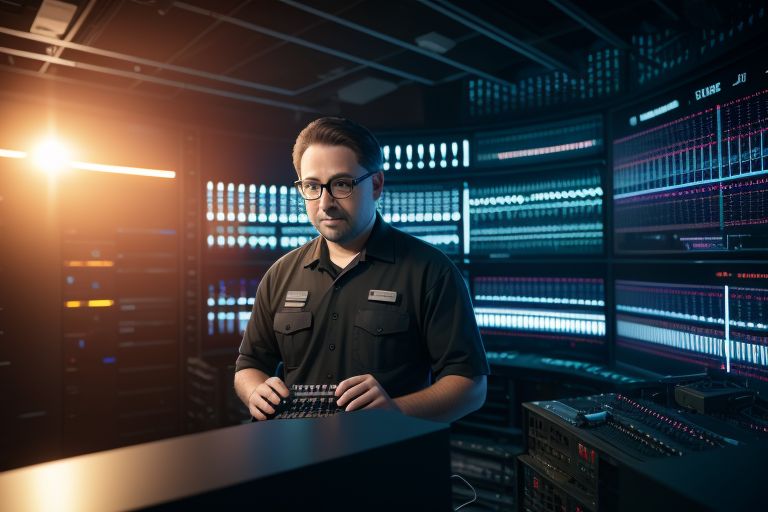The Video Engineer plays a critical role in ensuring that all video content is of the highest quality. This professional is responsible for maintaining, adjusting, and troubleshooting video equipment to ensure optimal performance during live and recorded broadcasts. The Video Engineer works closely with other technical staff to deliver clear, sharp, and properly balanced video output. This article delves into the diverse responsibilities of a Video Engineer, highlighting their significance, required skills, and the impact they have on the overall production.
The Role of a Video Engineer in Broadcast
A Video Engineer is tasked with overseeing the technical aspects of video production. They ensure that all video equipment is functioning correctly and that the video output meets the highest standards. Here’s a detailed look at their key responsibilities:
- Pre-Production Planning
- Equipment Preparation: The Video Engineer prepares all necessary video equipment, including cameras, monitors, switchers, and recording devices. They ensure that everything is in working order and ready for the shoot.
- Technical Setup: They assist in setting up video equipment according to the requirements of the production. This includes configuring cameras, setting up video switchers, and ensuring proper cable management.
- Testing and Calibration: The Video Engineer conducts thorough tests and calibrations of all video equipment. This includes adjusting color balance, contrast, brightness, and other settings to ensure optimal video quality.
- Production Execution
- Monitoring Video Quality: During production, the Video Engineer continuously monitors the video feed to ensure that the quality remains consistent. They make real-time adjustments to correct any issues that arise.
- Troubleshooting: They are responsible for diagnosing and resolving any technical problems with the video equipment. This includes fixing issues related to signal transmission, video playback, and recording.
- Coordination: The Video Engineer works closely with the camera operators, directors, and other technical staff to ensure that the video output aligns with the creative vision and technical standards of the production.
- Post-Production Support
- Equipment Maintenance: After filming, the Video Engineer performs routine maintenance on all video equipment. This includes cleaning, inspecting, and repairing any damaged components.
- Upgrades and Updates: They stay updated with the latest video technology and implement upgrades and updates to the equipment as needed. This ensures that the production team has access to the best possible tools.
- Review and Feedback: The Video Engineer reviews the recorded footage to ensure that it meets the desired quality standards. They provide feedback to the production team and suggest improvements for future productions.
Key Skills Required for a Video Engineer
Being an effective Video Engineer requires a combination of technical expertise, problem-solving skills, and attention to detail. Here are some of the most critical skills needed:
- Technical Proficiency: Video Engineers must have a deep understanding of video equipment and technology, including cameras, switchers, monitors, and recording devices.
- Problem-Solving: The ability to quickly diagnose and resolve technical issues is crucial, especially during live broadcasts.
- Attention to Detail: Precision and attention to detail are essential to ensure that all video output meets the highest quality standards.
- Communication: Effective communication with the production team and technical staff is vital for ensuring that all tasks are carried out smoothly.
- Adaptability: The ability to adapt to new technology and stay updated with the latest advancements in video equipment and techniques is essential.
The Impact of a Video Engineer
The Video Engineer’s role is central to the overall quality and success of a broadcast. Their work directly influences the clarity, consistency, and visual appeal of the video output. Here are some ways Video Engineers make a significant impact:
- Video Quality: By maintaining and adjusting video equipment, Video Engineers ensure that the video output is of the highest quality, enhancing the overall production value.
- Technical Reliability: They ensure that all video equipment functions correctly, minimizing technical issues and ensuring a smooth production process.
- Support for Creative Vision: By working closely with the production team, Video Engineers help achieve the desired visual aesthetic and support the creative vision of the broadcast.
- Efficiency: Efficient management and troubleshooting of video equipment ensure that productions run smoothly, minimizing downtime and delays.
The Video Engineer’s Workflow in Broadcast Production
To understand the role of a Video Engineer, it’s essential to look at their workflow in detail, from pre-production to post-production.
- Pre-Production Phase
- Preparation: The Video Engineer prepares all necessary video equipment, ensuring everything is in working order and ready for the production.
- Technical Setup: They assist in setting up video equipment according to the production requirements. This includes configuring cameras, setting up video switchers, and ensuring proper cable management.
- Calibration: The Video Engineer conducts thorough tests and calibrations of all video equipment, adjusting settings such as color balance, contrast, and brightness to ensure optimal video quality.
- Production Phase
- Monitoring: During production, the Video Engineer continuously monitors the video feed to ensure that the quality remains consistent. They make real-time adjustments to correct any issues that arise.
- Troubleshooting: They diagnose and resolve any technical problems with the video equipment, including issues related to signal transmission, video playback, and recording.
- Coordination: The Video Engineer works closely with the camera operators, directors, and other technical staff to ensure that the video output aligns with the creative vision and technical standards of the production.
- Post-Production Phase
- Maintenance: After filming, the Video Engineer performs routine maintenance on all video equipment, including cleaning, inspecting, and repairing any damaged components.
- Upgrades: They implement upgrades and updates to the equipment as needed, ensuring that the production team has access to the best possible tools.
- Review: The Video Engineer reviews the recorded footage to ensure that it meets the desired quality standards. They provide feedback to the production team and suggest improvements for future productions.
The Evolution of the Video Engineer’s Role
The role of the Video Engineer has evolved significantly with advancements in technology and changes in production methods. Today’s Video Engineers must stay updated with the latest tools and techniques in the industry:
- Digital Technology: The shift to digital video technology has transformed the way Video Engineers work, providing more precise control and higher quality video output.
- HD and 4K Resolution: The adoption of high-definition (HD) and 4K resolution has raised the standards for video quality, requiring Video Engineers to be proficient in managing these advanced formats.
- Remote Production: The ability to conduct remote production and monitoring has become increasingly important, especially during situations where on-site work is limited.
- Live Streaming: The rise of live streaming has added new dimensions to the Video Engineer’s role, requiring expertise in managing live video feeds and ensuring smooth, real-time broadcasts.
Real-World Examples of Video Engineers
To illustrate the impact and responsibilities of Video Engineers, let’s look at some real-world examples:
- Live News Broadcasting
- Video Engineer’s Role: In live news broadcasting, the Video Engineer ensures that all video feeds are clear, properly balanced, and seamlessly integrated. They monitor and adjust the video quality in real-time to accommodate changing conditions.
- Challenges: Live news requires quick decision-making and the ability to handle unexpected changes. The Video Engineer must ensure that all video equipment functions correctly and that the video output remains consistent.
- Sports Broadcasting
- Video Engineer’s Role: In sports broadcasting, the Video Engineer oversees the technical aspects of live sports events, managing multiple camera feeds, instant replays, and slow-motion captures. They ensure that the video quality captures the excitement and detail of the game.
- Challenges: Sports broadcasts involve fast-paced action and dynamic camera work, requiring the Video Engineer to make rapid adjustments to ensure a smooth and engaging broadcast.
- Television Shows
- Video Engineer’s Role: For television shows, the Video Engineer manages the video quality during recording and live broadcasts, ensuring that all visual elements are crisp, clear, and well-balanced.
- Challenges: Television productions often involve complex setups and multiple technical elements, requiring the Video Engineer to ensure that everything runs smoothly and meets the desired quality standards.
Conclusion
The role of a Video Engineer in broadcast is multifaceted and essential to the success of any production. Video Engineers are the technical experts who ensure that all video content is captured, processed, and delivered at the highest quality. Their responsibilities span technical, problem-solving, and collaborative tasks, requiring a unique blend of skills and expertise.
Video Engineers play a crucial role in ensuring high-quality video content, contributing significantly to the overall impact and success of the broadcast. Their work enhances the visual appeal, engages the audience, and ensures that the production runs smoothly and efficiently.
As the broadcasting landscape continues to evolve, the role of the Video Engineer will undoubtedly adapt and expand. However, their core responsibilities—maintaining and adjusting video equipment, ensuring technical excellence, and collaborating effectively with the production team—will remain as critical as ever.






Leave a Reply